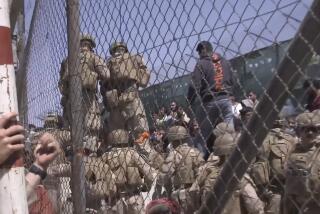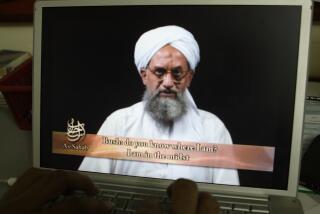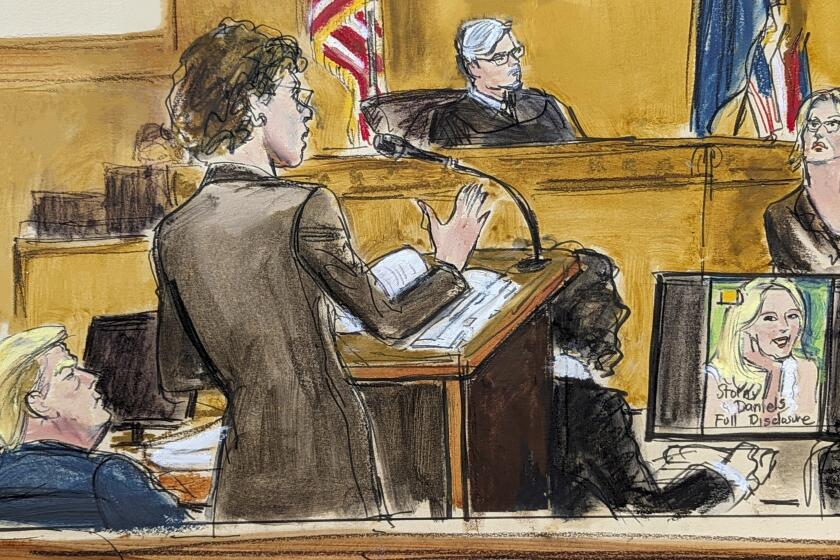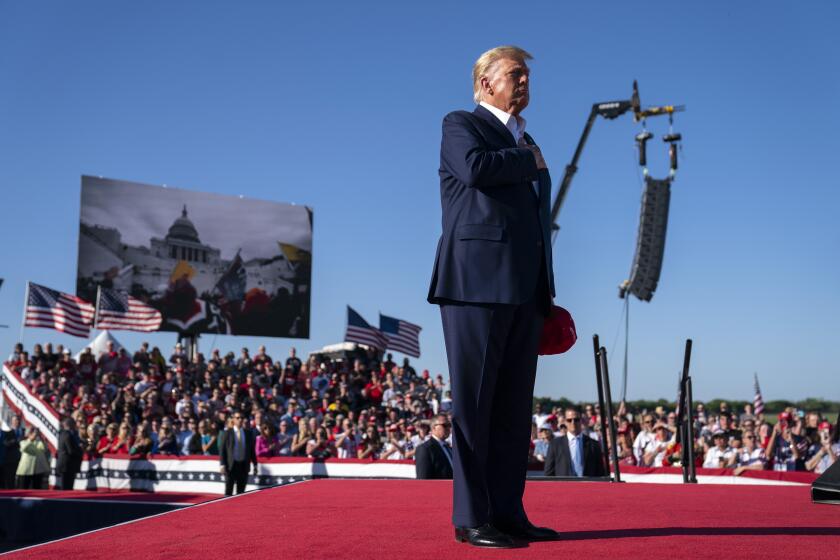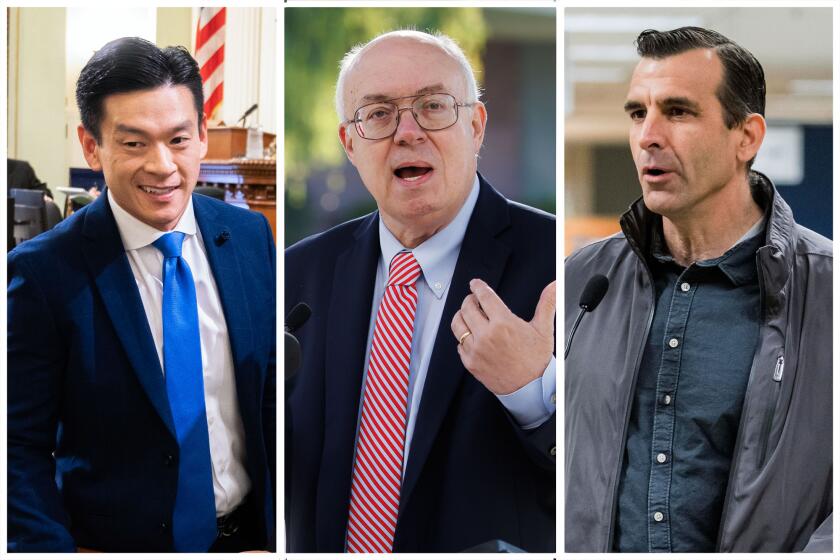Time on U.S. Side, Bush Says of Hunt
“It’s just a matter of time” before the United States captures Osama bin Laden, President Bush said Friday, expressing no concern that U.S. forces don’t know where the terrorist leader is or when he might be found.
“You don’t need to worry about whether or not we’re going to get him,” he said, “because we are.”
But the success of the campaign shouldn’t be defined by Bin Laden’s capture, he added, noting that U.S. troops may be deployed in Afghanistan “for quite a long period of time.”
Bush’s remarks reflected the latest challenge posed by the war on terrorism: maintaining a high level of public support for a lengthening overseas deployment of U.S. troops when military activity has lessened, progress is slow and one of the main objectives of the mission--the capture of the man Bush blames for the Sept. 11 terror attacks--remains frustratingly elusive.
So the president, speaking to a small group of reporters invited to his ranch for what turned into a 25-minute news conference, counseled patience and forbearance, defined what he would consider a successful mission, called for vigilance at home and said daily intelligence reports still warn that “Bin Laden or his cronies would like to harm America again.”
But the president derided Bin Laden as a man “on the losing side of a rout” and said: “This is a guy who, three months ago, was in control of a country. Now he’s maybe in control of a cave. He’s on the run.
“I like our position better than his.”
In a counterpoint to the president’s message that the United States won’t quit Afghanistan any time soon, the Afghan Defense Ministry on Friday continued to make statements that seemed aimed at asserting the country’s independence from U.S. policy goals.
‘America Cannot Bomb Afghanistan at Will’
In Kabul, the Afghan capital, ministry spokesman Mohammed Habeel said his nation wants the United States to halt its bombing campaign, possibly within days.
“Without the approval of local commanders and the Defense Ministry, America cannot bomb Afghanistan at will,” Habeel told news agency reporters. His boss is Defense Minister Mohammed Qassim Fahim, who in recent days has said that Bin Laden is in Pakistan, although what evidence he has of that was unclear.
Fahim reportedly met Friday with Lakhdar Brahimi, the United Nations’ special envoy to Afghanistan, and with the British commander of peacekeeping forces.
The admonition against U.S. bombing did not appear to have been cleared with the Afghan prime minister, Hamid Karzai. Sayed Najibullah Ashimi, a Karzai spokesman, promised a statement responding to the Defense Ministry pronouncement, but none was forthcoming.
John Kincannon, a spokesman for the U.S. diplomatic mission in Kabul, said he was unaware of any request for a halt in the U.S. bombing campaign.
“To the best of my knowledge, the Afghan interim administration has communicated no such view to the American government,” he said.
The bombing has been focused on areas where U.S. commanders believe that they may still be able to damage units of Al Qaeda, Bin Laden’s terrorist organization, even as Bin Laden’s location remains a mystery.
“I’ve read reports where he dyed his hair red,” Bush said. “That’s not going to stop us from finding him.”
President Is Briefed on Progress in War
Bush spoke outside his guest house with Army Gen. Tommy Franks--the commander of the Afghan campaign--at his side. Franks, who had visited Afghanistan this week, briefed Bush on the war’s progress Friday morning.
Asked how he would define a successful mission, the president said:
“Taliban gone, the country secure, the country stable, that Al Qaeda cells rounded up, Taliban fighters brought to justice. The over 6,000 . . . prisoners of war being held by our allies interrogated. . . . There’s a lot to do.
“And the American people just must understand when I said that we need to be patient, that I meant it,” Bush said. “I imagine us being there for quite a long period of time.”
In his disparaging comments about Bin Laden’s situation and his expressions of resolve, Bush appeared determined to preempt any criticism of the inability of U.S. and Afghan forces to find the terrorist leader.
That follows a consistent pattern: Conscious of how difficult it is to find a single fugitive, the administration from the outset has repeatedly discouraged Americans from viewing Bin Laden’s capture as the critical measure of success in the war.
“Success or failure depends not on Bin Laden. He’s just one person, a part of a network,” the president declared in October, presenting a theme he repeated Friday when he said the objective was “more than Bin Laden.”
Public Remains Focused on Bin Laden’s Fate
But polling suggests that most Americans remain focused on Bin Laden’s fate. In a recent Newsweek poll, 62% of Americans said the war would not be a success unless Bin Laden was captured.
“That poll is tapping into something real, and that is, people will continue to feel uneasy and unfulfilled as long as they don’t have any certainty about his death or capture,” said Andrew Kohut, director of the Pew Research Center for the People and the Press, an independent polling organization.
Kohut said that because the country views the overall war effort as a success, it’s unlikely that a failure to apprehend Bin Laden would cause Bush’s overwhelming public support to erode. But Kohut predicted that Americans are unlikely to feel life returning to anything approaching normal if the terrorist remains at large.
“Getting him will get us over . . . the first hump, a crucial hump, in getting back to normal,” Kohut said.
The president, who said he had seen only “snippets” of a Bin Laden videotape released this week, made clear that the U.S. government had little reliable information about its prey after the intensive bombing campaign.
“He’s on the run, if he’s running at all,” the president said. “We don’t know whether he’s in a cave with the door shut, or a cave with the door open. We just don’t know. . . . But one thing we know is that he’s not in charge of Afghanistan anymore.”
*
Gerstenzang reported from Crawford and Rubin from Kabul. Times staff writer Ronald Brownstein in Washington contributed to this report.
More to Read
Get the L.A. Times Politics newsletter
Deeply reported insights into legislation, politics and policy from Sacramento, Washington and beyond. In your inbox three times per week.
You may occasionally receive promotional content from the Los Angeles Times.
